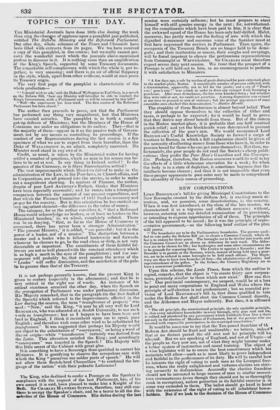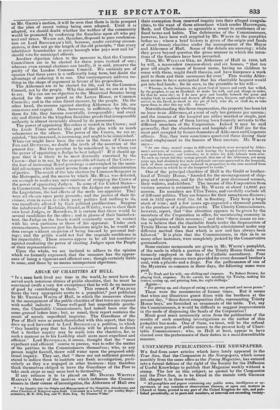NEW CORPORATIONS.
LORD BROUGHAM'S bill for giving Municipal Constitutions to the New Boroughs created by the Reform Act, is exciting much at- tention, and, we perceive, some dissatisfaction, in time country. When it was first introduced, at the close of the late session, we characterized it as a vigorous and efficient measure; without, however, entering into any detailed examination of its provisions, or intending to express approbation of all of them. The principle of the bill appeared to be sound; for it was the principle of repre- sentative government,—as the following brief outline of the plan will prove.
" The boundaries are to be the Parliamentary boundaries. The persons quali- fied to vote under the Reform Bill are to choose a Common Council, whose of- fice is to endure for three years. The boroughs are to be divided into wards, and the Common Council are to choose an Alderman for each ward. The Alder- men are to be chosen for life; but bankruptcy and some other circumstances are to be grounds fur removing them. The Crown to appoint a Recorder ; and the Recorder is to preside at the Sessions, which, instead of being held once a quar- ter, are to be ordered in some boroughs to be held much oftener. The Magis- tracy are thus to have two branches of duty—the administration of justice, and superintendence of the police. In the former, the Country Magistracy are to have a concurrent jurisdiction."
Upon this scheme, the Leeds Times, from which the outline is copied, remarks, that the object is "to create thirty new corpora- tions, precisely similar to those which now exist." How can this be ? Our provincial contemporary, we suspect, would be at a loss to point out many corporations in England and Wales where the principle of self-election is not predominant ; but an essential pro- vision of Lord BROUGHAM'S bill is, that those qualified to vote under the Reform Act shall elect the Common Council directly, and the Aldermen and Mayor indirectly. But then, it is affirmed that " The old principle, the constitutional principle, the only equitable principle, is, that every inhabitant householder in every borough, who pays scot and lot, is robbed and plundered by any government which withholds from him a share not only in the election of Members of Parliament, but of the persons who are invested with responsible participation in the municipal constitution."
It would be nonsense to say that the Ten-pound franchise of t!i Reform Act should be fixed and unalterable : we believe, indeed that at no distant period the old scot and lot principle will be adopted. But we are speaking of England, and not of Utopia—of the people as they now are, not of what they might become under a better system of instruction and moral training. The object of a wise legislator will be to create the best constituency which his materials will allow—such as is most likely to prove independent and faithful in the performance of its duty. He will be careful how he intrusts the right of voting to such men as the Liverpool free- men, whom the really enlightened and virtuous electors are striv- ing earnestly to disfranchise. Assuredly the elective franchise should not be intrusted to large masses of men in similar necessi- tous circumstances (even though they should not be so thoroughly sunk in corruption), unless protection in its faithful exercise is in some way extended to them. The ballot should go band in hand with the extension of the right of voting to all inhabitant house- holders, But if we look to the decision of the House of Commons
on Mr. GROTE'S motion, it will be seen that there is little prospect of the plan of secret voting being soon adopted. Until it is
adopted, we should doubt whether the welfare of the community would be promoted by conferring the franchise upon all who pay rent and taxes. We are not, therefore, disposed to pass condemna-
tion on Lord 'BROUGHAM'S bill, because, under existing circum- stances, it does not go the length of the old principle, " that every inhabitant householder in every borough who pays scot and lot' should vote for municipal officers.
Another objection taken to the measure is, that the Common Councilmen are to be elected for three years instead of one; whereas even annual elections can hardly, it is said, .preserve the purity of the London Common Council. We certainly are of opinion that three years is a sufficiently long term, but doubt the advantage of reducing it to one. Our contemporary adduces no- thing in the shape of argument in favour of his proposition.
The Aldermen are to be elected for life, and by the Common Council, not by the people. Why this should be, we are at a loss to say. We can see no objection to the Municipal Senates being elected for the same period as the Lower House, or Common Councils; and in the same direct manner, by the people. On the other hand, the reasons against electing Aldermen for life, are numerous and cogent. One, however, is. sufficient,—by electing them for life, they become essentially irresponsible; and every -city and district in the kingdom furnishes proofs that irresponsible authority is ahriost invariably abused by its possessors. The power of appointino. Recorders is vested in the Crown ; and the Leeds Times attacks this part of the plan with as much vehemence as the others. The power of the Crown, we are re- minded, "has increased, is increasing, and ought to be diminished." Whatever might have been the case in the times of CHARLES Fox and DUNNING, we doubt the truth of the assertion at the present day. But the question to be considered is, in whom can the power of appointing a Judge be best lodged? If it should ap- pear that it is likely to be most discreetly exercised by the Crown—that is to say, by the responsible advisers of the Crown— the fear of increasino. Royal patronage is outweighed by the mani- fold advantages which must accrue from a superior administration of justice. The result of the late election for Common Sergeant in the Metropolis, and the means by which Mr. HILL was defeated, are enough to render any man cautious of stripping the Crown of the power of appointing Judges. In some of tile United States— in Connecticut, for example—where the Judges are appointed by the Legislature, the bad effects of the mode are apparent. They were all chosen upon party grounds; and the justice of their de- cisions, even in cases in NI Mich party politics had nothing to do, was manifestly affected by their political predilections. Suppose the inhabitants of Rochdale, S treud, or Whitby, were to elect their own local Judges, or Recorders, it is certain that there would be several candidates for the office ; and in places of their limited ex- tent, the Judge on the bench would constantly come in contact with his own partisans or those of his opponent. Under such circumstances, however just his decisions might be, be would sel- dom escape without suspicion of being biassed by personal feel- ings; and the public would not feel the requisite confidence in his impartiality. These reasons appear to be all but conclusive against conferring the power of electing JudgeS upon the People er their representatives. Upon the whole, we arc inclined to adhere to the opinion which we formerly expressed, that the measure has the appear- .ance of being a vigorous and efficient one; though certainly liable to some, and those by no means unimportant objections.



















 Previous page
Previous page